TAIWAN: THE PERENNIAL ANGUISH OF INVASION
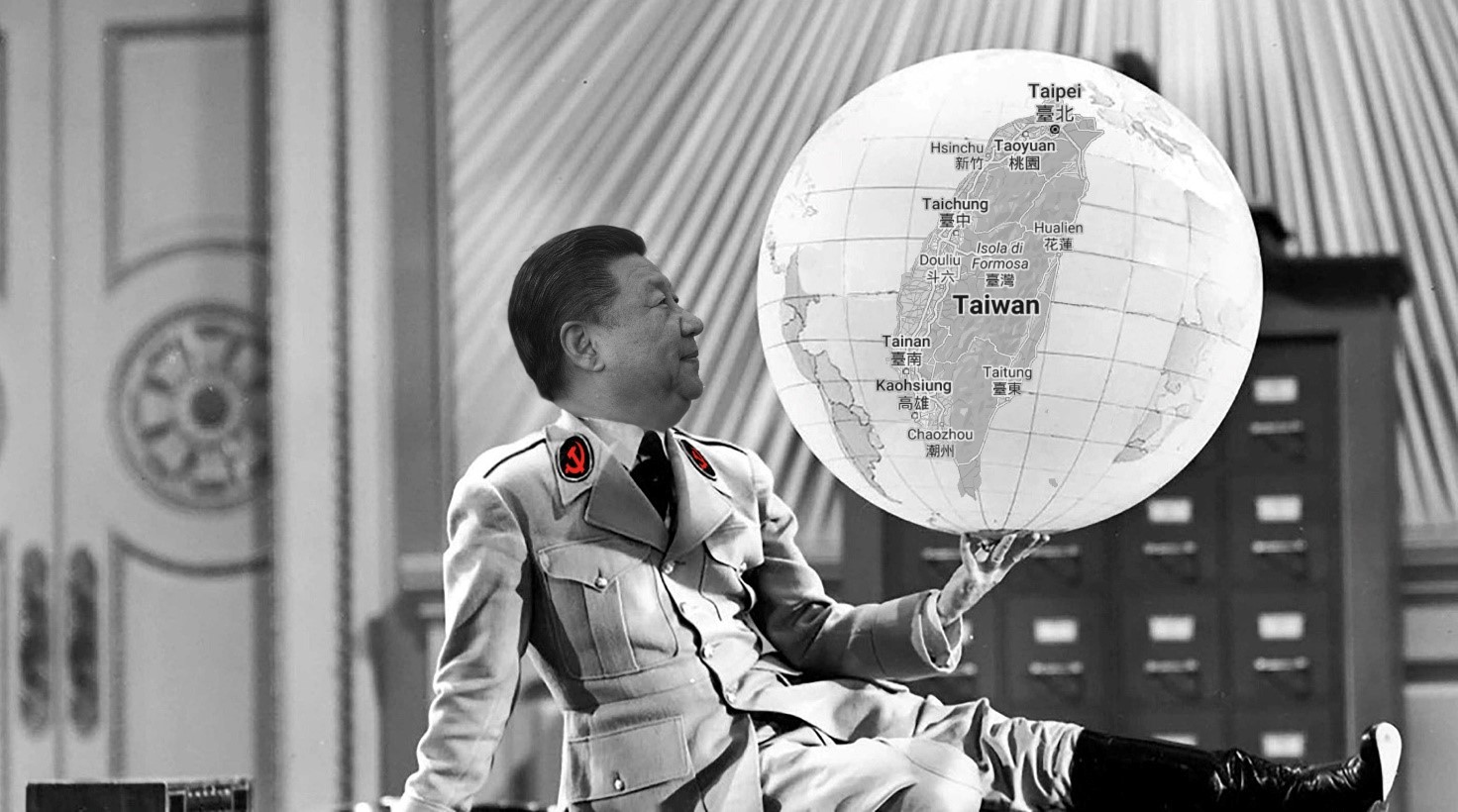
The island of Taiwan: only 150 km away from China, 24 million inhabitants and an area one and a half times the size of Sicily, a state that hardly any country in the world recognises, not least for fear of antagonising China. It is the coveted prey of the Dragon Country, which wants to annex it. A determined Xi Jinping publicly promises to do it ‘by hook or by crook’.
At the centre of bloody disputes for half a millennium, one of the most recent decided its fate as a ‘suspended’ country. At the end of World War II, Japan, having seized the island, lost the war and in 1951 the island returned to the hands of the People’s Republic of China through the San Francisco Peace Conference[1] . But in China, the situation was complicated, the Chinese Communist Party (CCP) and the Kuomintang (KMT, Chinese Nationalist Party) were in a perpetual struggle: the first Civil War broke out in 1927, a war in which the CCP got the worst of it[2] . The two parties, united in ousting the Japanese, split in 1946 in the second phase of the civil war, which ended with the victory of the Communists led by Mao Zedong, while the Kuomintang (KMT) government, led by Chiang Kai-Shek, retreated to Taiwan[3] .
Mainland China, under the control of the Communist government, creates the People’s Republic of China (PRC), with Beijing as its capital, while the Republic of China (ROC) is established in Taiwan. Mainland China adopts a policy of diplomatic isolation towards Taiwan: but while it is intent on rebuilding the country and consolidating internal power in search of economic and political stability, it finds itself facing pressure and harsh criticism from the international community for this policy[4] .
The distance between China and Taiwan is gradually growing, and the former is increasingly opposed, especially by the United States, which offers Taiwan political and military support[5] . But times change, China initiates a profound change in foreign policy to grow its economy and improve its relations with the rest of the world. It has no choice: the situation with Taiwan must also be dealt with diplomatically, adopting all possible tolerance, thus averting international tensions that are always lurking. Accordingly, with Taiwan, the line is to avoid large-scale conflicts[6] . Taiwan has its own political system, government, constitution, army and currency. Since 1996, its people have freely elected their own president and parliament. But it is a state that China stubbornly refuses to recognise, which also hinders recognition by other entities such as the United Nations, where China has a permanent seat[7] .
A coveted prey
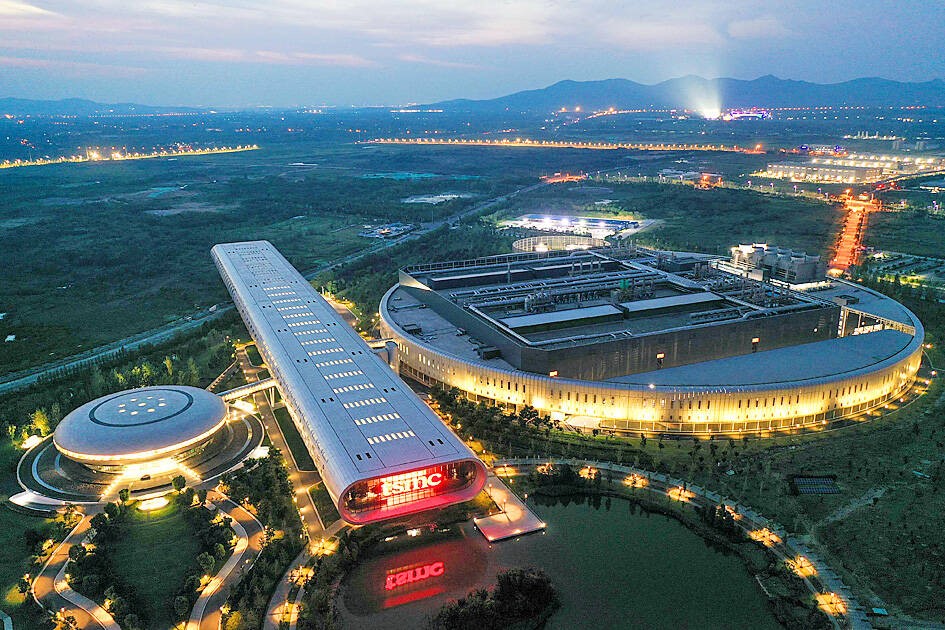
The TSMC industrial complex in Taiwan, the world’s largest producer of electronic chips[8]
Over the years, China has taken a pragmatic approach towards Taiwan, seeking to normalise relations through a series of economic, cultural and humanitarian contacts. But despite the apparent benevolent and cooperative attitude, Beijing never ceases to regard Taiwan as an indivisible part of its territory, maintaining political and diplomatic pressure for international recognition and emphasising the principle of ‘one China’: a goal for which it would not hesitate to resort to the use of force. The pressure has increased considerably in recent years, reaching unprecedented levels of alarm. The situation between China and Taiwan is complex, balanced between conflict and cooperation, and continues to influence global politics.
Beyond the prevailing nationalist rhetoric, it is important to understand why Taiwan is considered such a coveted and irresistible prey. The island encompasses a number of aspects that make it invaluable to global balances, both geopolitically and industrially. It is home to one of the most developed and industrialised economies in East Asia, specialising in manufacturing and technology. But the real uniqueness lies in the electronics sector: Taiwanese companies hold a market share of 68% of the world’s semiconductor production, with Taiwan Semiconductor Manufacturing Company (TSMC) being the world’s largest contract chip producer and producing around 90% of the world’s cutting-edge semiconductors, used for instance in artificial intelligence and quantum computing applications.
No other company is capable of producing chips on such a sophisticated scale as those produced by TSMC, which supply the major technology giants such as Qualcomm, Apple, MediaTek, Nvidia, Advanced Micro Devices (AMD), Intel, Samsung and many others. If the company for some reason stopped distributing their products, it would be a planetary catastrophe. This creates a highly dependent situation, because the rest of the world, despite their efforts, cannot compete. According to a report published by Accenture[9] , to achieve self-sufficiency in the chip industry, the US would need at least 300,000 new engineers, programmers and specialised personnel. The report argues that no country in the world is able to train enough personnel on its own to achieve self-sufficiency in the semiconductor industry: it is not so much a question of technology or investment, but of skilled human resources.
In the major American technology hubs, such as Silicon Valley and MIT (the Massachusetts Institute of Technology, one of the most important research universities in the world), most of the ‘brains’ are of Asian origin, mostly Chinese and Taiwanese: the world therefore depends not only on the materials produced in these areas, but also on the specialised personnel trained there. Emblematic is the ‘China Initiative’ launched in 2018 by the Trump administration[10] , a measure that promises to combat industrial espionage, on the assumption that there is a network of Eastern, predominantly Chinese, researchers and students dedicated to stealing intellectual property from the American technology sector. The result is disastrous: the initiative sends shivers down the spines of the scientific and industrial leaders who realise the danger, numerous researchers are unduly pilloried without ever arriving at a conviction, jeopardising entire research sectors and triggering the resentment of their countries, jeopardising collaborations[11] .
In February 2022, the initiative was suspended, having caused untold damage and having proved totally ineffective in achieving its goals[12] . The disaster generated by the idea that global exchange only concerns goods and not intellect is a harsh lesson: applying technological protectionism is the stupidest, most deleterious if not impossible thing in such a highly interconnected world.
The dominion of the sea
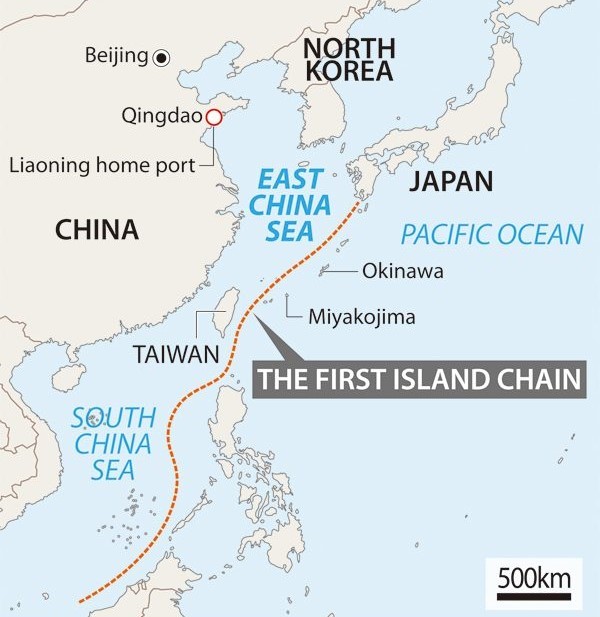
Geographical representation of the ‘First Island Chain[13]
The other major issue is geostrategic dominance and security: Taiwan is located at the centre of the so-called First Chain of Islands that runs from Japan southwards through Taiwan and the Philippines and on to Indonesia and Malaysia. This position is considered extraordinarily strategic because, if China controlled Taiwan, it would be easier for it to exit its ports to the Pacific, posing a threat to Japan, which is totally dependent on East Asian sea routes for energy supplies and many other raw materials. The opening of these ‘maritime highways’ could allow China the use of submarines, a real threat to the US Seventh Fleet, Hawaii, and realistically also to the US west coast. Moreover, such control would encourage hostilities from North Korea, the other country that threatens peace and stability in the region and enjoys China’s protection.
Beijing therefore does not hesitate to show its desire to re-annex Taiwan, and its attitude has become increasingly aggressive, especially since the election of President Tsai Ing-wen in 2016, the leader of the Democratic Progressive Party (DPP), who pursues an intransigent line against Chinese claims and refuses to accept a détente formula that her predecessor, Ma Ying-jeou, approved of. Tsai, in her inaugural speech at her election (2016), emphasised that she had been ‘elected president in accordance with the Constitution of the Republic of China’, which is a document uniting China, and stated that she would ‘safeguard the sovereignty and territory of the Republic of China’. He also promised that he would ‘conduct cross-strait affairs in accordance with the Constitution of the Republic of China’[14] . But this is a formulation that Beijing rejects, is deemed incomplete as it does not openly embrace the ‘One China’ principle[15] and therefore decides to break off diplomatic ties with Taiwan[16] .
Since then, there has been a steady escalation of hostile Chinese statements and demonstrative actions, characterised mainly by the display of their military might. Tensions escalated to a high point in August 2022, when Nancy Pelosi, the Speaker of the US House of Representatives, visited Taiwan, arriving in Taipei accompanied by a delegation of five Democratic parliamentarians for a meeting with President Tsai Ing-wen[17] .
Nancy Pelosi’s visit
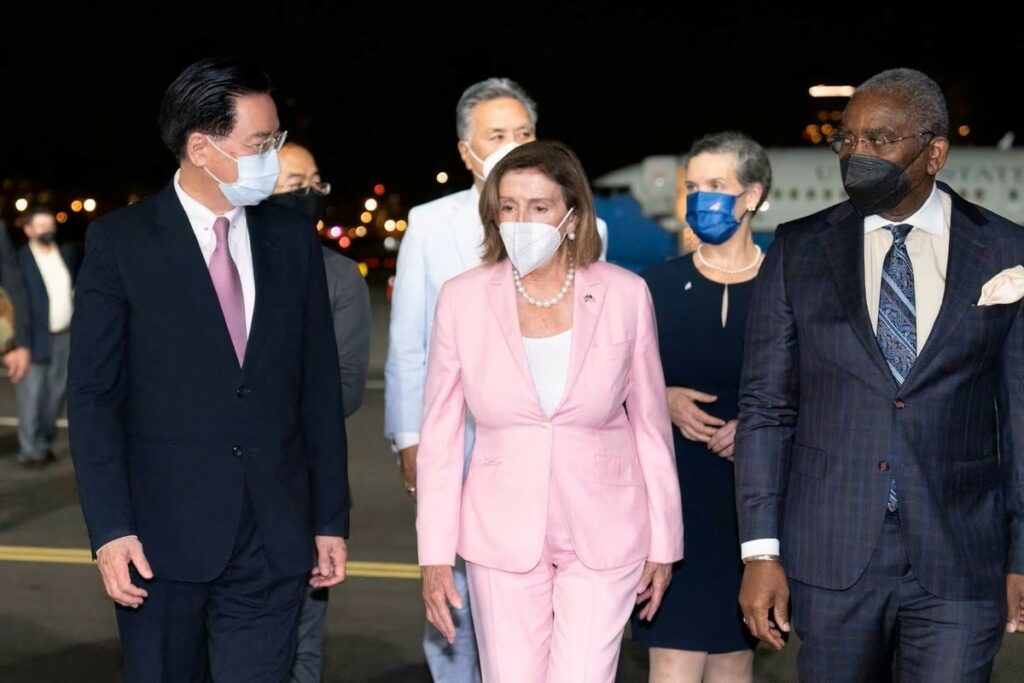
August 2022: Nancy Pelosi, visiting Taiwan, unleashes Beijing’s fury[18]
It is the first visit to Taipei by a high US representative since 1997, and the event is seen in Beijing as a provocation: not only does Pelosi represent the third highest US institutional office, but she has also always been one of the American voices most critical of the CCP. The week before, having heard about the meeting, Xi Jinping, furious, called President Biden and, after a two-and-a-half-hour phone call, ended with the warning: “those who play with fire will get burned”[19] . The Chinese Foreign Ministry states that ‘Pelosi’s visit seriously damages peace and stability in the Taiwan Strait, has a serious impact on the political foundation and integrity of Sino-US relations, and seriously violates China’s sovereignty and territory’[20] .
The visit takes place against a background of extremely high tensions: the White House Coordinator for Strategic Communications at the US National Security Council, John Kirby, warns on the evening of 1 August that China might greet the visit with a missile launch near Taiwan or might conduct other military exercises, also stating that in the event of an attack, the US would react[21] . But despite Biden’s reluctant attitude, unconvinced of the merits of the trip[22] , Nancy Pelosi chose to go anyway and, as expected, her visit triggered a harsh Chinese reaction.
On 3 August, the Chinese Liberation Army Navy (PLAN), together with the People’s Liberation Army Air Force (PLAAF), began an extensive series of manoeuvres in the airspace and waters surrounding Taiwan, including the launch of 11 Dongfeng-15 short-range ballistic missiles (DF-15, also capable of carrying nuclear warheads) into the waters to the east, northeast and southeast of Taiwan – five of those missiles fell into the waters of Japan’s exclusive economic zone[23] . On 7 August, along the median line between China and Taiwan, 14 warships and 66 fighter planes were engaged in military manoeuvres, with some of them crossing the eastern part in the direction of the island; the following day, 13 Chinese ships and 39 planes conducted similar manoeuvres, with fighter-bombers once again trespassing[24] .
In response, Taiwan deploys its ships and aircraft to defend itself against a possible attack: the scenario is that of an imminent conflict. According to the public dispatch issued by the Chinese news agency Xinhua, the exercises are intended to serve as a ‘stern warning to separatist supporters of Taiwan independence, foreign elements and their provocations’[25] .
In a televised speech on 4 August, Taiwanese President Tsai Ing-wen condemned China’s aggressive behaviour and promised to ‘resolutely defend our nation’s sovereignty and security as a bulwark of democracy and freedom’, but on the whole the political and civil society response seems to be mild. The composed behaviour of the Taiwanese is an unmistakable sign of a people who have already chosen sides, who already have a clear idea of their future and are not easily intimidated.
But the lukewarm reaction is likely to put China’s political leaders on edge: if a show of force of this magnitude fails to have a significant impact on Taiwanese thinking, they will find themselves at a crossroads: opt for a policy of soft power or increase the dose of aggression[26] . The choice will instead be to sever military relations with the United States[27] .
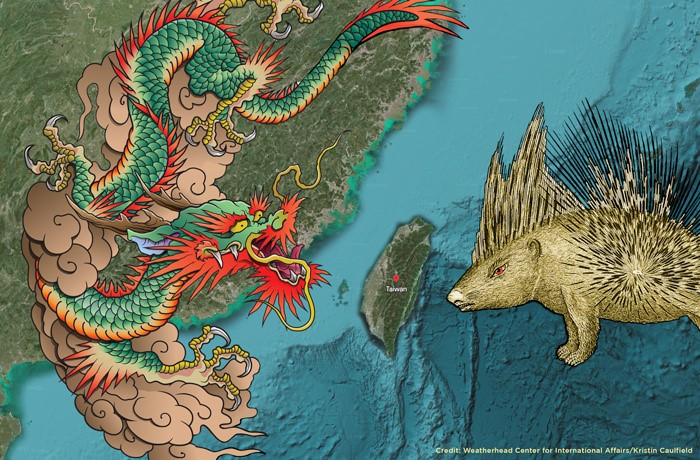
Taiwan exploits its geographical advantages to implement the ‘hedgehog strategy’, many small defence systems to severely hinder a possible Chinese attack[28] .
Since then, there has been an escalation of episodes of show of force: while along the coast of mainland China opposite Taiwan, the army strengthens its military bases[29] , between 5 and 6 September of this year, 103 warplanes take off in the direction of Taiwan, a number never seen before. The planes, as is now customary, trespass and then turn back[30] , while dozens of warships ply the surrounding waters: a real siege.
The question that the whole world is asking during those hours is whether China is putting on a show to intimidate Taiwan or whether it is concretely preparing to implement its ancient design, the reconquest of the island. In reality, according to observers, the question is rather complex and certainly China, before feeling ready to launch an eventual attack, is waiting to equalise its arsenals at least with those of the United States, especially as far as the naval fleet is concerned. According to a US Pentagon report[31] China, in addition to increasing all other armaments, is about to increase its nuclear weapons arsenal very rapidly, with the intention of quadrupling it by 2035. Today it has 400 nuclear warheads in its possession, which could rise to 1,000 by 2030 and 1,500 by 2035[32] . The naval fleet, like the air fleet, is growing year by year.
In addition, the Chinese Liberation Army (PLA) is the largest army in the world with 2 million troops and with a much stronger naval, air and fire force than the Taiwanese, which has only 160,000 troops[33] . But in recent years, Taiwan has also grown considerably militarily[34] . Not only are funds multiplied to expand air defence and missile equipment, but Taipei also receives various new armaments and aid in the form of technology and assistance at various levels from the US, as well as from the UK, Canada, Australia, South Korea, India and Spain[35] .
In 2023 alone, Taiwan orders $1.55 billion worth of arms and services from the US, including infrared tracking systems for F-16 jets, ammunition and aircraft spare parts, while in previous years it buys drones, anti-tank munitions systems artillery systems, Paladin howitzers, AIM-9X Sidewinder air-to-air missiles, Stinger surface-to-air missiles, MK-48 Mod6 submarine torpedoes, AGM-154C JSOW air-to-ground missiles as well as field communications equipment and training packages[36] .
The real wild card for Taiwan is the geographical advantage: experts consider the island’s hinterland particularly hostile due to its pronounced mountainousness and the density of urban areas. The short distance from China makes the mainland coasts easy targets for missiles and aircraft as well as naval approaches; docking would also be difficult, due to a coastal conformation that would leave little room for amphibious operations[37] . This situation pushes Taiwan to a defence strategy nicknamed ‘the hedgehog’: to invest in a large number of small and diverse defence systems in order to implement an asymmetrical protection that would create very serious problems for those who would want to conquer the island.
Then there is the determination of the Taiwanese people, an aspect that could make all the difference, a bit like the determination of the Ukrainian people largely underestimated by Putin[38] . Last but not least, the role of the United States: even if the Ukrainian experience and the current less than favourable international situation could induce the American government to be particularly cautious, it is nevertheless true that it is unlikely to stand by and watch, despite the fact that there is no formal agreement on the defence of Taiwan, since the risk of losing a large part of its control of the Pacific would lead to substantial changes with far-reaching repercussions in the geopolitical balances and in which the United States would have everything to lose .[39]
The game is anything but a foregone conclusion, and in this situation the cost of an eventual conflict could be very high for all involved. Beijing is well aware of this and seeks other avenues, such as trying to bend politics and popular sentiment in the region, despite Xi Jinping’s few friends on the island.
Presidential elections just around the corner

From left to right, Taiwanese presidential candidates Lai Ching-te, Hou Yu-ih, Ko Wen-je and Terry Gou[40]
In this particularly complex historical phase, Taiwan is preparing for presidential elections in January 2024. Just like the economic, diplomatic and military worlds, the political world is also strongly influenced by the conflicting relationship between the People’s Republic of China and Taiwan: on the one hand, the so-called Pan-Blue Coalition, led by the Kuomintang and advocating a line of dialogue and cooperation with Beijing – and which has traditionally never abandoned the idea of reunification with the mainland; on the other hand, the Pan-Green Coalition, dominated by the DPP, which has always been in favour of independence.
A recent poll sees the independents represented by 48.9% of the population, 26.9% want the status quo while only 11.8% want unification with China[41] and a comparison with previous polls shows the desire for independence growing steadily. The poll split by party is interesting: among DPP supporters, 72% favour independence, 1% want the status quo while 5% support unification with China. In contrast, the nationalist KMT party is more fragmented, with 18% in favour of independence, 36% want the status quo while only 35% want unification[42] .
The election of the president is a matter of formidable weight: directly elected for a maximum of two four-year terms, he appoints the premier with the consent of parliament. The executive yuan, or cabinet, consists of ministers appointed by the president on the recommendation of the premier. In practice, the president holds most of the executive power.
In January 2020, first female president Tsai Ing-wen of the Democratic Progressive Party (DPP) wins a second term in office with 57.1% of the vote (after the first one she won in 2016), defeating the conservative Han Kuo-yu of the KMT, who has 38.6% of the vote, and James Soong of the centre-right People First Party, with 4.3%. However, following the DPP’s poor performance in the 2022 local elections, President Tsai Ing-wen resigned as party leader, her leadership was in question, and her party was on the verge of splitting due to tensions with the more radical current led by Lai Ching-te (also known by his British name William Lai), also a former premier, a role she relinquished in January 2019.
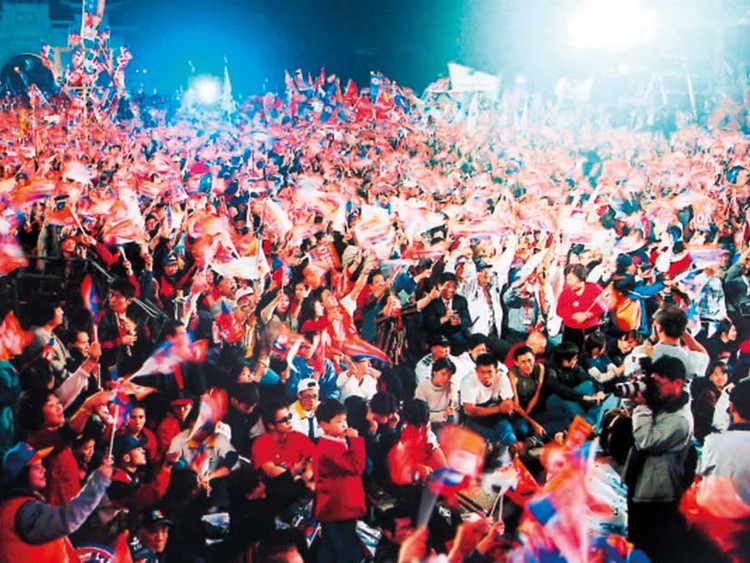
14 July 1987: Taiwanese government ends more than 30 years of martial law[43]
This year, Lai Ching-te is running for the next presidential election, while Tsai Ing-wen, political difficulties aside, would not be able to run again, her possible third term is not allowed by the Constitution. The current political landscape sees mainly three former mayors and a wealthy businessman lined up for the presidency: Lai Ching-te, Ko Wen-je, Hou You-yi and Terry Gou.
Lai Ching-te, a 63-year-old former mayor of Tainan and public health expert, has been in politics since 1996; currently aligned with DPP, he is firmly one of the ‘greenest’, i.e. pro-independence. Compared to the outgoing President, Lai has more outspoken separatist positions and, in the event of his election, a tough confrontation with Xi Jinping is expected[44] . Lai’s clear and decisive positions enjoy great popularity: although he has recently suffered a major decline, he is considered the favourite and polls put him at 34%[45] .
The former mayor of Taipei Ko Wen-je , on the other hand, is a controversial figure and considered ambiguous by many: supported by the DPP during his mayoral bid in 2014 as an independent, five years later he founded the Taiwan People’s Party (TPP) and became a fierce opponent of the ruling party[46] . On the subject of independence, he supports the ‘one country two systems’ formula, has ideas rather close to the KMT, but does not disdain those of the DPP; he is pro-American but not too much, appreciates the status quo but calls on Beijing to change it. Polls put him at 23%[47] : unlikely to win, but still has the potential to influence the vote.
The former mayor of New Taipei City, 65-year old Hou You-yi, has been a member of the KMT since 1975 and is a popular moderate political figure who espouses the idea of a unified Chinese nation, but does not gather the majority, especially of the young, who are largely in favour of independence. This is a big problem for him since, also by virtue of his age, he has a rather elderly base. Moreover, he has a very controversial past: before entering politics, Hou had a career in the Taiwanese police force, which lasted several decades, operating in an authoritarian climate of martial law. He is known to have been particularly active in the persecution of pro-independence pro-democracy leaders and has also been accused of having links to organised crime[48] .
Hou You-yi openly declares that he is against Taiwan’s independence, while he considers the ‘one country two systems’ formula possible as long as China is allowed to take control of the nation. In his statements, he repeats that ‘the Republic of China is our country and Taiwan is our home’ and that ‘Taiwan independence has no legal basis, so I oppose it’[49] . Despite his positions, he is nevertheless popular: polls put him in second place for the time being with just under 25% of the vote[50] .
His candidature is rather painful: the KMT tries to keep him out, due to the fact that Hou is mistrusted within the party as a ‘benshengren’ (originally from Taiwan, as opposed to the ‘waishengren’, who have their origins outside Taiwan) and because of his past proximity to the DPP. But in the end he won the primaries, despite the fact that his challenger has a high-sounding name: Terry Gou, the multi-billionaire entrepreneur and founder of Foxconn[51] .
A complicated candidature

Summer 2018: Terry Gou with Donald Trump, then President of the United States[52]
On 28 August this year came the announcement: billionaire Terry Gou, founder of Foxconn, one of the world’s largest manufacturers of electrical and electronic components, is running for the 2024 presidential election. Gou was born on 18 October 1950 in Banqiao district, Taipei county. The son of parents from Shanxi Province in mainland China who fled to Taiwan in 1949, his father is a former Chinese National Revolutionary Army officer who fought during the civil war for the Kuomintang[53] .
After graduating in law from Soochow University in Taipei, Gou worked in a rubber factory and then in a medicine factory until the age of 24. In 1974, with $7500 from his mother and a workforce of ten employees, he founded Hon Hai Precision Industry in Taipei (now known as Foxconn): producing plastic parts for television sets in a rented warehouse in Tucheng, a suburb of Taipei. The first breakthrough came in 1980 when he received an order from Atari to make the joystick for its console[54] .
In 1988 he opened his first company in mainland China, in Shenzhen, where he now has his largest factory. From there on, growth is exponential: in 1996 it starts building chassis for Compaq desktop computers, and its orders expand to pre-assembled computers for high-profile customers, including HP, IBM and Apple. Within a few years, Foxconn transformed into a consumer electronics giant, acquired Sharp, Belkin and Linksys, and became the supplier of choice for American giants such as Intel and Apple[55] . Today, it has a turnover of more than 200 billion dollars a year and employs more than one million people, working in 27 factories. In addition, there is an immense supply chain. For years, it has been at the centre of criticism concerning the inhuman treatment of its workers: long working hours, low wages and precarious housing conditions, conditions that allegedly even led to the death of some workers during the Covid epidemic[56] .
Tery Gou in 2016, soon after Trump’s election as US President, reveals that he wants to enter politics, running for president in 2020: he says he wants to enter politics because he is dissatisfied with the inefficiency of the current government and because in a dream the sea goddess, Mazu, tells him to ‘step up and do something for the people of Taiwan’[57] . In 2019, he reveals his closeness to the Kuomintang and Donald Trump[58] . Endowed with an enormous ego and a deep contempt for traditional politicians, he possesses a rough and determined personality, at times irascible and violent, which he is not afraid to show in public, just as he does not hide his closeness to Beijing: he meets with Xi Jinping to discuss business, and the latter is said to pamper Gou, given his ability to move billions of dollars and hundreds of thousands of workers – so that his descent into politics could change the country’s fortunes[59] .
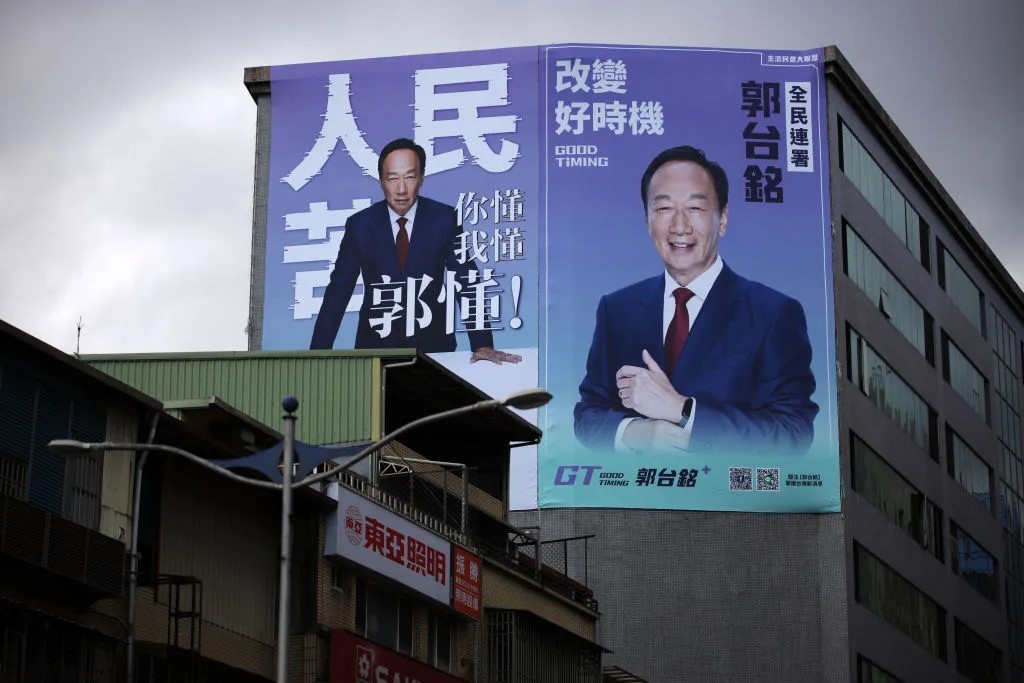
Terry Gou on election posters for the 2024 presidential election[60]
His extensive industrial activities in China and his proximity to the communist power chambers cause concern among Taiwanese. Many see him as a threat to freedom and democracy. Despite the expectations created around him, on 15 September 2019, to much surprise, Gou announces his withdrawal from the presidential race, but warns: ‘even though I did not participate in the presidential election, this does not mean I have given up politics’[61] . He keeps his promise and runs again as an independent (the KMT refuses to support him) for the 2024 presidential election: at the end of August 2023 comes the announcement at a particularly critical stage for Taiwan, with the spectre of Chinese invasion looming as never before.
Gou’s known positions pose a real threat to independence, with Tsai Ing-wen at the end of her second term, with the DPP in power for eight years and a new victory would be unprecedented in 27 years of democratic history; Lai Ching-te, the favoured candidate with extremist pro-independence positions, though widely appreciated by the people, poses a threat to stability in view of an easy souring of the already strained relations with China (for Beijing Lai is a ‘separatist troublemaker’[62] ).
In order to stand as a candidate, Gou has to collect at least 290,000 signatures by November, and his campaign goes ahead with the clear and decisive message: ‘one China’, promising peace between Taiwan and China within four years. The candidature irritates the opposition, as the field is already overcrowded and he would only add fragmentation. The KMT urges the electorate to support Hou Yu-ih, but Gou is determined: his dream is to convince the other two opposition figures to step down and follow him[63] but for now the polls put him at 8%, no doubt a loser[64] .
On 1 November, the 290,000 signatures were handed over to the electoral commission. At the same time, the authorities announced a criminal investigation for corruption against Gou: he had allegedly obtained the signatures in exchange for money. The alleged cases of corruption, at least twenty in number, which the prosecutors investigate, also lead to the arrest of several people[65] . One of these concerns the rather curious attempt to bribe a farmers’ association, which was allegedly offered a supply of toilet paper worth USD 900 by Gou supporters in exchange for their votes![66] . Corruption in Taiwan is punished with very severe penalties: up to seven years in prison and a fine of up to NT$ 10 million (over USD 310,000)[67] .
The investigation seems to be widening by the hour and would focus on the financial links between the suspects and Gou’s campaign: if the allegations are confirmed, his candidature would be seriously jeopardised. Most likely, the timeframe between the investigation and the pronouncement of possible charges suggests that nothing can happen before the elections take place[68] .
The attempt to influence the vote
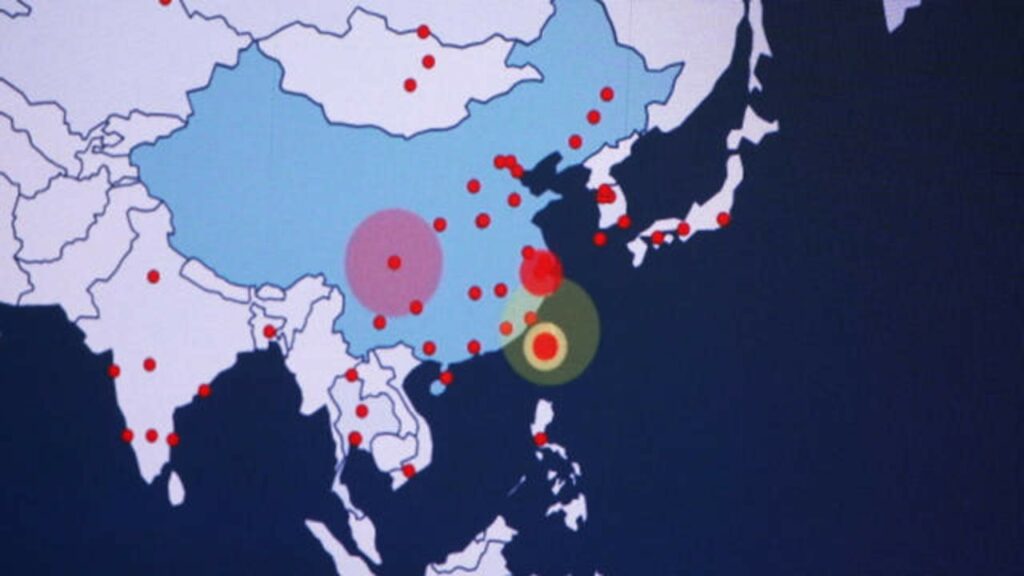
Cyber warfare is a silent but massive war, to which Taiwan is subjected on a daily basis[69]
In the previous local elections in 2018 and the presidential elections in 2020, a massive disinformation campaign is being deployed to counter Tsai Ing-wen’s election: a 2019 report by V-Dem Democracy, a project of the University of Gothenburg in Sweden that evaluates the functioning of democracies, reveals that Taiwan is the target of disinformation practices by China more than any other country in the world[70] . The most used tools are mainly hacks and bots (automatic disinformation generation tools) through social media platforms such as Facebook, blogging services such as Weibo and popular chat apps such as Line; some Taiwanese media are bought by wealthy Chinese entrepreneurs while others collaborate directly with the Chinese Communist Party: some media, such as the powerful Want Want China Times Media Group, agree their publications directly with the Chinese government[71] .
The Taiwanese are rather assiduous consumers of online media, so Beijing knows it can rely on the same strategy today and with even more refined tools. The Director General of Taiwan’s National Security Bureau, Tsai Ming-yen, says that China moves on three main fronts: military pressure, economic coercion, and fake news. With digitalisation becoming more and more prevalent, it is undoubtedly disinformation activities that, in order to manipulate public opinion, exploit opinion polling companies and public relations firms in the pay of Beijing[72] .
The false information feeding social media is aimed at damaging public morale, sowing mistrust towards the US (a video of a White House conference with made-up subtitles and a fake threat is circulating: ‘The US will abandon Taiwan in case of invasion’) and creating expectations in mainland China. Despite the fact that anti-Chinese sentiment is quite widespread, Puma Shen, director of the research group DoubleThink Lab, asked several Taiwanese university students what they thought was the source of the misinformation, and 20 % believed it was the US and Japan[73] .
For years, Taiwan has been under the constant crossfire of cyber-attacks: the Vice-Minister of Digital Affairs (a ministry created ad hoc in 2022 due to the exponential increase in cyber risks – just think that all critical infrastructures such as gas, water and electricity are highly digitised), Lee Huai Jen, speaks of at least 100 million attacks per year, the vast majority of them from China[74] . A cyber war of disruptions, activities and hacking, large-scale attacks on infrastructures, assaults against digital targets including blocking access or defacing government websites[75] .

Another war is being waged on the business front: the Investigation Bureau of the Taiwan Ministry of Justice reveals that Beijing tries to influence several small and medium-sized Taiwanese companies investing in China, offering them money in exchange for financing or simple assistance to pro-Chinese politicians[77] . The Association of Taiwanese Investment Enterprises on the Mainland is the most important vehicle of Chinese influence: founded in 2007, ATIEM is a business association, run under the auspices of the Taiwan Affairs Office (TAO), consisting of about 300 Taiwanese-funded enterprises and their members in China, which lobbies for Taiwanese enterprises both in China and Taiwan[78] : the association is known for its lobbying of the Taiwanese government in 2012 in an attempt to annul a rule preventing citizens from taking roles in state organs or and parties in mainland China[79] . Pressure from these groups could have a high impact on the elections, considering that at least 163,000 Taiwanese work in China[80] and represent a pool with great political potential.
On 12 April this year, Beijing launches an investigation into Taiwan’s alleged restrictive trade measures against China, targeting more than 2500 products from the agricultural, mineral, chemical and textile sectors. The Taiwanese government’s Trade Negotiations Office accuses Beijing of carrying out actions in violation of World Trade Organisation (WTO) rules and charges it with politically motivated activity to interfere with Taiwan’s elections through economic coercion. The risk is the adoption of countermeasures that could severely damage the island’s exports and economic development, with serious consequences in the financial markets[81] .
During Tsai’s first term, Beijing passed economic incentive policies to attract more companies and people from Taiwan, and at least two major measures were implemented between 2018 and 2019[82] . But during the second term, China’s attitude changes dramatically and it institutes a combination of import restrictions on a wide range of products, the enforcement of arbitrary regulations targeted against certain products, against certain companies for their political activities, and used to sanction individuals and organisations[83] .
At the centre of the coercion are mainly Taiwanese farmers and fishermen, who are prevented from exporting to China several dozen products accused of carrying harmful pests, chemicals or other irregularities – all reasons considered specious by Taiwan. Restrictions have increased considerably since Nancy Pelosi’s visit in 2022, with China increasing import blockades for more than 2000 of the approximately 3200 products from the island and covering sectors such as petrochemicals, textiles, machinery and transport[84] .
The antibodies of a young democracy

Taiwan proves to be a solid democracy[85]
Political pluralism and participation are two elements that characterise Taiwan. The spectre of Hong Kong hangs over the Taiwanese citizen – he knows that in the event of annexation he would not be treated any better: the mass protests of 2014 and 2019 have only accelerated the hegemony of a Beijing that violates all promises of independence in Hong Kong; year after year, democracy and rights have been eroded by an increasingly authoritarian government thirsting for revenge against opponents, the media or anyone who stands in the way of the CCP’s thinking; repression, arbitrary arrests and torture are widespread practices[86] .
In Taiwan, the accomplishment of a vibrant democracy proves to be an effective antidote to Chinese influences and the constant threats are experienced by the population with realism, pragmatism and relative calm, in stark contrast to the way the international community observes them. The Taiwanese are aware that an aggression represents a real prospect, and so they prepare themselves: thanks to specialised groups such as the Forward Alliance, which organise ad hoc courses[87] , tens of thousands of citizens participate in military training where they acquire defence techniques and learn how to use weapons of war, or in first aid courses where they learn how to treat gunshot or knife wounds, or how to splint a fractured leg and transport the wounded . [88]
Preparations are also being made with more sophisticated activities: associations such as the Kuma Academy (financed by Taiwanese technology magnate Robert Tsao) organise courses to cope with media and cyber warfare, train citizens to recognise fake news and defend themselves against anti-Taiwanese propaganda and cyber attacks[89] . But it is undoubtedly experience that plays a key role: it is now clear to everyone that information plays a pivotal role in this conflict, and President Tsai herself, who is very active on social media, is used to using calm and reassuring tones. Even the account of the Ministry of National Defence provides information based on facts and without propagandistic emphasis.
The fact is that this part of the Pacific has become the point of convergence of the strategic priorities of the United States and some of its major allies. The economic dynamism of the Indo-Pacific countries makes this area the engine of global economic growth, and the political, economic and military rise of the People’s Republic of China has turned this region into the main theatre of strategic competition between an emerging power and the declining US power, assuming the role of a ‘pivotal rival’ for the US.
Beijing’s assertive behaviour, which is a source of concern for many countries, is prompting a strengthening of alliances: one example is the QUAD Quadrilateral Security Dialogue[90] , established in 2007 to deter Chinese aggression, led by the Americans and the Japanese, Indians and Australians. Or the AUKUS military pact[91] announced in 2021 between the US, the UK and Australia, which consists of three elements: the sale of three to five Virginia-class submarines to Australia by the US starting in 2032; the co-development of a new AUKUS-class submarine by the UK and Australia to enter service around 2040; and a multi-billion dollar commitment by all three countries to expand the capacity of a trilateral submarine industrial base.
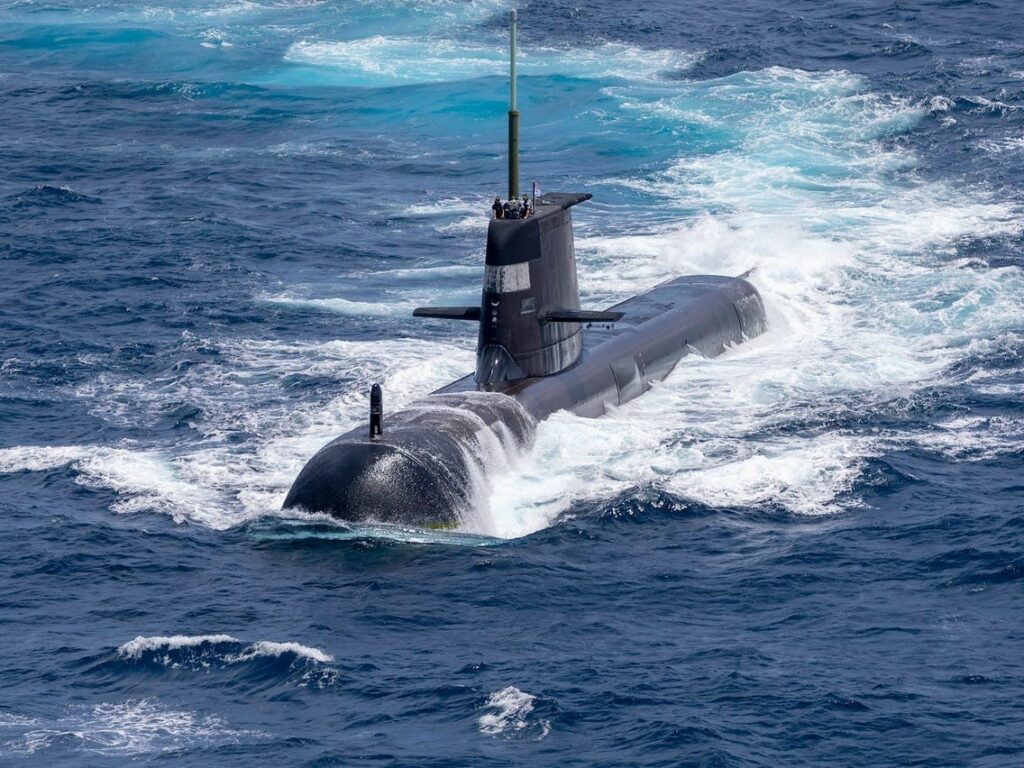
September 2021: The first sea launch of the new Australian nuclear submarine AUKUS[92]
But will China ever launch its slash? No one knows if and when the attack might be launched – several US officials speculate on a time window ranging from 2024 to 2035. But what could happen in the event of an attack? One of the most important assessments comes from the Center for Strategic and International Studies (CSIS), a Washington think tank that runs a computer simulation of a Chinese amphibious invasion of Taiwan[93] : the reconstruction based on an attack initiated in 2026, reveals that ‘the United States, Taiwan, and Japan have defeated a conventional amphibious invasion by China and maintained an autonomous Taiwan’. But according to the simulation, the cost would be enormous for all parties: two aircraft carriers at the bottom of the Pacific along with dozens of US and allied ships, tens of thousands of American soldiers killed, the Chinese navy in chaos, and the Chinese Communist Party destabilised. The simulation states: All that remains is deterrence and averting war[94] .
Analysts cannot predict whether it will happen, but almost all agree on one fact: the attack would have unpredictable consequences in the international arena and would certainly be disastrous for the aggressor as well, and no head of state who knows how to use reason and who loves his country would ever launch it. This would also have been said for the Ukrainian conflict against Vladimir Putin, yet the facts show that anything is possible. All that remains is to hope that Xi Jinping will at least choose the Soft Power strategy as in the past, and that it will always be the people of Taiwan who remain free to choose for their own destiny.
JPN027
[1] https://treaties.un.org/doc/publication/unts/volume%20136/volume-136-i-1832-english.pdf
[2] https://www.oxfordreference.com/display/10.1093/oi/authority.20110803095608165
[3] https://www.oxfordreference.com/display/10.1093/oi/authority.20110803095608165
[4] https://core.ac.uk/download/pdf/19135781.pdf
[5] https://avalon.law.yale.edu/20th_century/chin001.asp ; https://www.ait.org.tw/taiwan-relations-act-public-law-96-8-22-u-s-c-3301-et-seq/
[6] https://core.ac.uk/download/pdf/19135781.pdf
[7] https://core.ac.uk/download/pdf/19135781.pdf
[8] https://www.taipeitimes.com/News/biz/archives/2022/10/11/2003786778
[9] https://www.accenture.com/it-it/insightsnew/high-tech/semi-talent-shortage
[10] https://www.justice.gov/opa/speech/attorney-general-jeff-sessions-announces-new-initiative-combat-chinese-economic-espionage
[11] https://www.theguardian.com/us-news/2021/sep/15/abolish-trump-era-china-initiative-academics-urge-amid-racial-profiling-criticism
[12] https://www.theguardian.com/us-news/2022/feb/24/china-initiative-us-rebadges-trump-era-scheme-seen-as-persecuting-chinese-academics
[13] https://japan-forward.com/taiwan-a-tasty-target-chips-or-no-chips/
[14] https://english.president.gov.tw/News/4893
[15] https://www.cnbc.com/2016/05/22/china-pressures-taiwans-president-tsai-ing-wen-to-acknowledge-one-china.html
[16] https://apnews.com/article/a9482a5d03d14ab3a134bff857eaaf4b
[17] https://www.reuters.com/world/asia-pacific/pelosi-expected-arrive-taiwan-tuesday-sources-say-2022-08-02/
[18] https://www.reuters.com/world/asia-pacific/pelosi-expected-arrive-taiwan-tuesday-sources-say-2022-08-02/
[19] https://www.ndtv.com/world-news/those-who-play-with-fire-eventually-get-burned-xi-tells-biden-on-taiwan-3203743
[20] https://www.reuters.com/world/asia-pacific/pelosi-expected-arrive-taiwan-tuesday-sources-say-2022-08-02/
[21] https://www.reuters.com/world/asia-pacific/pelosi-begins-closely-watched-asia-tour-singapore-2022-08-01/
[22] https://www.ispionline.it/it/pubblicazione/pelosi-taiwan-una-visita-non-gradita-35933
[23] https://www.armscontrol.org/act/2022-09/news/china-reacts-aggressively-pelosis-taiwan-visit
[24] https://www.armscontrol.org/act/2022-09/news/china-reacts-aggressively-pelosis-taiwan-visit
[25] https://www.aljazeera.com/news/2023/8/29/taiwan-warns-of-surge-in-tensions-as-chinese-fighter-jets-cross-median-line
[26] https://www.armscontrol.org/act/2022-09/news/china-reacts-aggressively-pelosis-taiwan-visit
[27] https://apnews.com/article/taiwan-china-asia-beijing-b252479810add6a225fa1e4a6d441983
[28] https://epicenter.wcfia.harvard.edu/blog/protecting-porcupine-why-taiwan-matters
[29] https://apnews.com/article/china-taiwan-warships-military-drills-aircraft-carrier-b537171dff8a187933afb0fde004ea9a
[30] https://apnews.com/article/taiwan-china-flights-b8a78493341bd3af15f4fd58be692e4d
[31] https://media.defense.gov/2023/Oct/19/2003323409/-1/-1/1/2023-MILITARY-AND-SECURITY-DEVELOPMENTS-INVOLVING-THE-PEOPLES-REPUBLIC-OF-CHINA.PDF
[32] https://apnews.com/article/taiwan-europe-china-united-states-beijing-af4dd76e993f450df7af8e63d1a0187c
[33] https://www.aljazeera.com/news/2023/10/10/how-prepared-is-taiwan-for-a-war-with-china#:~:text=By%20some%20estimates%2C%20a%20huge,China’s%20population%20and%20military%20strength.
[34] https://www.aljazeera.com/news/2023/10/10/how-prepared-is-taiwan-for-a-war-with-china#:~:text=By%20some%20estimates%2C%20a%20huge,China’s%20population%20and%20military%20strength.
[35] https://www.aljazeera.com/news/2023/10/10/how-prepared-is-taiwan-for-a-war-with-china#:~:text=By%20some%20estimates%2C%20a%20huge,China’s%20population%20and%20military%20strength.
[36] https://www.aljazeera.com/news/2023/10/10/how-prepared-is-taiwan-for-a-war-with-china#:~:text=By%20some%20estimates%2C%20a%20huge,China’s%20population%20and%20military%20strength.
[37] https://tnsr.org/2021/12/a-large-number-of-small-things-a-porcupine-strategy-for-taiwan/
[38] https://tnsr.org/2021/12/a-large-number-of-small-things-a-porcupine-strategy-for-taiwan/
[39] https://epicenter.wcfia.harvard.edu/blog/protecting-porcupine-why-taiwan-matters
[40] https://asia.nikkei.com/Politics/Taiwan-elections/Taiwan-s-presidential-front-runner-faces-potential-coalition
[41] https://www.taipeitimes.com/News/taiwan/archives/2023/09/02/2003805648
[42] https://www.taipeitimes.com/News/taiwan/archives/2023/09/02/2003805648
[43] https://gulfnews.com/today-history/july-14-1987-taiwan-lifts-martial-law-1.2058229
[44] https://www.aljazeera.com/news/2023/8/25/taiwan-vice-president-emphasises-islands-autonomy
[45] https://www.taiwannews.com.tw/en/news/5030519
[46] https://www.ft.com/content/3a6978d7-0367-4801-9c9d-2319186aa6aa
[47] https://www.ft.com/content/3a6978d7-0367-4801-9c9d-2319186aa6aa
[48] https://newbloommag.net/2018/04/10/hou-kmt-ntaipei-candidate/
[49] https://www.taipeitimes.com/News/taiwan/archives/2023/05/11/2003799597
[50] https://www.taiwannews.com.tw/en/news/5030519
[51] https://www.taipeitimes.com/News/taiwan/archives/2018/04/07/2003690847
[52] https://forbes.it/2021/05/03/terry-gou-re-elettronica-partito-capannone-taiwan/
[53] https://min.news/en/taiwan/470dfd0164e4c4c33cced9e41d9b0b52.html
[54] https://www.emsnow.com/icons-of-industry-terry-gou-foxconn/
[55] https://thrivemyway.com/foxconn-stats/
[56] https://www.wsj.com/articles/SB10001424052748704026204575267603576594936 ; https://www.wsj.com/articles/deaths-of-foxconn-employees-highlight-pressures-faced-by-chinas-factory-workers-1471796417 ; https://www.youtube.com/watch?v=m9DXebls8Bc
[57] https://thediplomat.com/2019/04/foxconn-ceo-terry-gou-says-a-sea-goddess-has-told-him-to-run-for-president/
[58] https://www.ft.com/content/bb5833c6-61eb-11e9-b285-3acd5d43599e
[59] https://www.ft.com/content/bb5833c6-61eb-11e9-b285-3acd5d43599e
[60] https://time.com/6330382/taiwan-alleged-bribery-foxconn-terry-gou-election/
[61] https://www.reuters.com/article/us-taiwan-election-idUSKBN1W11XR
[62] https://edition.cnn.com/2023/09/01/asia/taiwan-presidential-election-terry-gou-intl-hnk/index.html
[63] https://www.forbes.com/sites/russellflannery/2023/05/17/tech-billionaire-terry-gou-loses-taiwan-presidential-election-bid-again/?sh=5499ff927149
[64] https://www.agenzianova.com/en/news/presidential-elections-in-taiwan-three-terry-gou-supporters-arrested-for-collecting-signatures-by-giving-away-toilet-paper/
[65] https://www.taiwannews.com.tw/en/news/5035937
[66] https://economictimes.indiatimes.com/tech/technology/toilet-paper-bribes-taiwan-probes-foxconn-founder-terry-gous-campaign/articleshow/104916293.cms
[67] https://economictimes.indiatimes.com/tech/technology/toilet-paper-bribes-taiwan-probes-foxconn-founder-terry-gous-campaign/articleshow/104916293.cms
[68] https://www.taiwannews.com.tw/en/news/5035937
[69] https://www.cbsnews.com/news/china-cyber-assault-taiwan-60-minutes-2023-06-18/
[70] https://v-dem.net/documents/16/dr_2019_CoXPbb1.pdf
[71] https://www.cfr.org/in-brief/how-china-interfering-taiwans-election
[72] https://www.reuters.com/world/asia-pacific/taiwan-says-china-has-very-diverse-ways-interfering-election-2023-10-04/
[73] https://www.cbsnews.com/news/china-cyber-assault-taiwan-60-minutes-2023-06-18/
[74] https://timesofindia.indiatimes.com/world/china/taiwan-suffering-from-cyber-attacks-from-china-claims-taiwanese-deputy-minister-of-digital-affairs/articleshow/101170960.cms?from=mdr
[75] https://www.cbsnews.com/news/china-cyber-assault-taiwan-60-minutes-2023-06-18/ ; https://www.reuters.com/world/asia-pacific/taiwan-defence-ministry-website-hit-by-cyber-attacks-amid-china-tensions-2022-08-04/
[76] https://zizonline.com/republic-of-china-taiwan-national-day-2023/
[77] https://globaltaiwan.org/2023/04/china-ramps-up-economic-coercion-on-taiwan-ahead-of-2024-elections/
[78] https://web.archive.org/web/20200225163302/http://www.qgtql.com/dsq/
[79] https://globaltaiwan.org/2023/04/china-ramps-up-economic-coercion-on-taiwan-ahead-of-2024-elections/
[80] https://www.taipeitimes.com/News/biz/archives/2023/04/12/2003797746
[81] https://focustaiwan.tw/cross-strait/202310090015
[82] https://globaltaiwan.org/2019/11/fortnightly-review-v4-i22/
[83] https://globaltaiwan.org/2023/04/china-ramps-up-economic-coercion-on-taiwan-ahead-of-2024-elections/
[84] https://globaltaiwan.org/2023/04/china-ramps-up-economic-coercion-on-taiwan-ahead-of-2024-elections/
[85] https://www.nextgenpolitics.org/blog/taiwans-fight-for-independence
[86] https://apnews.com/article/voting-rights-china-hong-kong-932009be8d2a91ef2f84e6e406d290b4
[87] https://en.wikipedia.org/wiki/Forward_Alliance ; https://www.upi.com/Top_News/World-News/2023/04/05/taiwan-Kuma-Academy-Taiwan-civil-defense-training-China-invasion/3671680721096/
[88] https://www.axios.com/2022/07/26/taiwan-civil-defense-china-russia-invasion-ukraine
[89] https://www.axios.com/2022/09/27/taiwanese-citizens-training-cyber-war-china
[90] https://www.cfr.org/in-brief/quad-indo-pacific-what-know
[91] https://www.defense.gov/Spotlights/AUKUS/
[92] https://www.businessinsider.com/australia-aukus-nuclear-powered-subs-in-pacific-amid-china-tensions-2021-11?r=US&IR=T
[93] https://www.csis.org/analysis/first-battle-next-war-wargaming-chinese-invasion-taiwan
[94] https://www.cbc.ca/news/world/taiwan-china-invasion-1.6969717


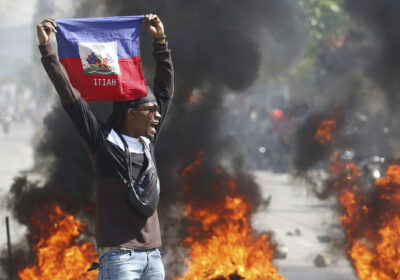
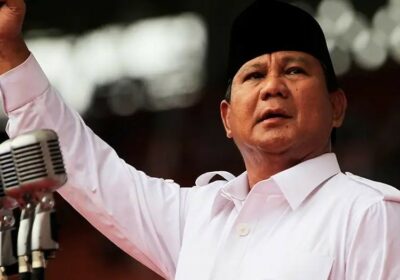
Leave a Reply